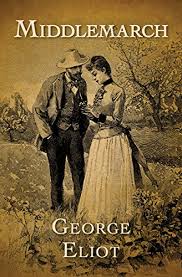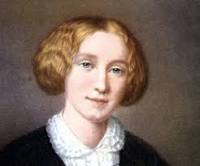Middlemarch Page #27
Middlemarch, A Study of Provincial Life is a novel by the English author George Eliot, appearing in eight instalments in 1871 and 1872. Set in a fictitious Midlands town from 1829 to 1832, it follows distinct, intersecting stories with many characters.
The Miss Vincy who had the honor of being Mr. Chichely’s ideal was of course not present; for Mr. Brooke, always objecting to go too far, would not have chosen that his nieces should meet the daughter of a Middlemarch manufacturer, unless it were on a public occasion. The feminine part of the company included none whom Lady Chettam or Mrs. Cadwallader could object to; for Mrs. Renfrew, the colonel’s widow, was not only unexceptionable in point of breeding, but also interesting on the ground of her complaint, which puzzled the doctors, and seemed clearly a case wherein the fulness of professional knowledge might need the supplement of quackery. Lady Chettam, who attributed her own remarkable health to home-made bitters united with constant medical attendance, entered with much exercise of the imagination into Mrs. Renfrew’s account of symptoms, and into the amazing futility in her case of all strengthening medicines. “Where can all the strength of those medicines go, my dear?” said the mild but stately dowager, turning to Mrs. Cadwallader reflectively, when Mrs. Renfrew’s attention was called away. “It strengthens the disease,” said the Rector’s wife, much too well-born not to be an amateur in medicine. “Everything depends on the constitution: some people make fat, some blood, and some bile—that’s my view of the matter; and whatever they take is a sort of grist to the mill.” “Then she ought to take medicines that would reduce—reduce the disease, you know, if you are right, my dear. And I think what you say is reasonable.” “Certainly it is reasonable. You have two sorts of potatoes, fed on the same soil. One of them grows more and more watery—” “Ah! like this poor Mrs. Renfrew—that is what I think. Dropsy! There is no swelling yet—it is inward. I should say she ought to take drying medicines, shouldn’t you?—or a dry hot-air bath. Many things might be tried, of a drying nature.” “Let her try a certain person’s pamphlets,” said Mrs. Cadwallader in an undertone, seeing the gentlemen enter. “He does not want drying.” “Who, my dear?” said Lady Chettam, a charming woman, not so quick as to nullify the pleasure of explanation. “The bridegroom—Casaubon. He has certainly been drying up faster since the engagement: the flame of passion, I suppose.” “I should think he is far from having a good constitution,” said Lady Chettam, with a still deeper undertone. “And then his studies—so very dry, as you say.” “Really, by the side of Sir James, he looks like a death’s head skinned over for the occasion. Mark my words: in a year from this time that girl will hate him. She looks up to him as an oracle now, and by-and-by she will be at the other extreme. All flightiness!” “How very shocking! I fear she is headstrong. But tell me—you know all about him—is there anything very bad? What is the truth?” “The truth? he is as bad as the wrong physic—nasty to take, and sure to disagree.” “There could not be anything worse than that,” said Lady Chettam, with so vivid a conception of the physic that she seemed to have learned something exact about Mr. Casaubon’s disadvantages. “However, James will hear nothing against Miss Brooke. He says she is the mirror of women still.” “That is a generous make-believe of his. Depend upon it, he likes little Celia better, and she appreciates him. I hope you like my little Celia?” “Certainly; she is fonder of geraniums, and seems more docile, though not so fine a figure. But we were talking of physic. Tell me about this new young surgeon, Mr. Lydgate. I am told he is wonderfully clever: he certainly looks it—a fine brow indeed.” “He is a gentleman. I heard him talking to Humphrey. He talks well.” “Yes. Mr. Brooke says he is one of the Lydgates of Northumberland, really well connected. One does not expect it in a practitioner of that kind. For my own part, I like a medical man more on a footing with the servants; they are often all the cleverer. I assure you I found poor Hicks’s judgment unfailing; I never knew him wrong. He was coarse and butcher-like, but he knew my constitution. It was a loss to me his going off so suddenly. Dear me, what a very animated conversation Miss Brooke seems to be having with this Mr. Lydgate!” “She is talking cottages and hospitals with him,” said Mrs. Cadwallader, whose ears and power of interpretation were quick. “I believe he is a sort of philanthropist, so Brooke is sure to take him up.” “James,” said Lady Chettam when her son came near, “bring Mr. Lydgate and introduce him to me. I want to test him.” The affable dowager declared herself delighted with this opportunity of making Mr. Lydgate’s acquaintance, having heard of his success in treating fever on a new plan. Mr. Lydgate had the medical accomplishment of looking perfectly grave whatever nonsense was talked to him, and his dark steady eyes gave him impressiveness as a listener. He was as little as possible like the lamented Hicks, especially in a certain careless refinement about his toilet and utterance. Yet Lady Chettam gathered much confidence in him. He confirmed her view of her own constitution as being peculiar, by admitting that all constitutions might be called peculiar, and he did not deny that hers might be more peculiar than others. He did not approve of a too lowering system, including reckless cupping, nor, on the other hand, of incessant port wine and bark. He said “I think so” with an air of so much deference accompanying the insight of agreement, that she formed the most cordial opinion of his talents. “I am quite pleased with your protege,” she said to Mr. Brooke before going away. “My protege?—dear me!—who is that?” said Mr. Brooke. “This young Lydgate, the new doctor. He seems to me to understand his profession admirably.” “Oh, Lydgate! he is not my protege, you know; only I knew an uncle of his who sent me a letter about him. However, I think he is likely to be first-rate—has studied in Paris, knew Broussais; has ideas, you know—wants to raise the profession.” “Lydgate has lots of ideas, quite new, about ventilation and diet, that sort of thing,” resumed Mr. Brooke, after he had handed out Lady Chettam, and had returned to be civil to a group of Middlemarchers. “Hang it, do you think that is quite sound?—upsetting the old treatment, which has made Englishmen what they are?” said Mr. Standish. “Medical knowledge is at a low ebb among us,” said Mr. Bulstrode, who spoke in a subdued tone, and had rather a sickly air. “I, for my part, hail the advent of Mr. Lydgate. I hope to find good reason for confiding the new hospital to his management.” “That is all very fine,” replied Mr. Standish, who was not fond of Mr. Bulstrode; “if you like him to try experiments on your hospital patients, and kill a few people for charity I have no objection. But I am not going to hand money out of my purse to have experiments tried on me. I like treatment that has been tested a little.” “Well, you know, Standish, every dose you take is an experiment-an experiment, you know,” said Mr. Brooke, nodding towards the lawyer.
Translation
Translate and read this book in other languages:
Select another language:
- - Select -
- 简体中文 (Chinese - Simplified)
- 繁體中文 (Chinese - Traditional)
- Español (Spanish)
- Esperanto (Esperanto)
- 日本語 (Japanese)
- Português (Portuguese)
- Deutsch (German)
- العربية (Arabic)
- Français (French)
- Русский (Russian)
- ಕನ್ನಡ (Kannada)
- 한국어 (Korean)
- עברית (Hebrew)
- Gaeilge (Irish)
- Українська (Ukrainian)
- اردو (Urdu)
- Magyar (Hungarian)
- मानक हिन्दी (Hindi)
- Indonesia (Indonesian)
- Italiano (Italian)
- தமிழ் (Tamil)
- Türkçe (Turkish)
- తెలుగు (Telugu)
- ภาษาไทย (Thai)
- Tiếng Việt (Vietnamese)
- Čeština (Czech)
- Polski (Polish)
- Bahasa Indonesia (Indonesian)
- Românește (Romanian)
- Nederlands (Dutch)
- Ελληνικά (Greek)
- Latinum (Latin)
- Svenska (Swedish)
- Dansk (Danish)
- Suomi (Finnish)
- فارسی (Persian)
- ייִדיש (Yiddish)
- հայերեն (Armenian)
- Norsk (Norwegian)
- English (English)
Citation
Use the citation below to add this book to your bibliography:
Style:MLAChicagoAPA
"Middlemarch Books." Literature.com. STANDS4 LLC, 2024. Web. 26 Nov. 2024. <https://www.literature.com/book/middlemarch_242>.




Discuss this Middlemarch book with the community:
Report Comment
We're doing our best to make sure our content is useful, accurate and safe.
If by any chance you spot an inappropriate comment while navigating through our website please use this form to let us know, and we'll take care of it shortly.
Attachment
You need to be logged in to favorite.
Log In